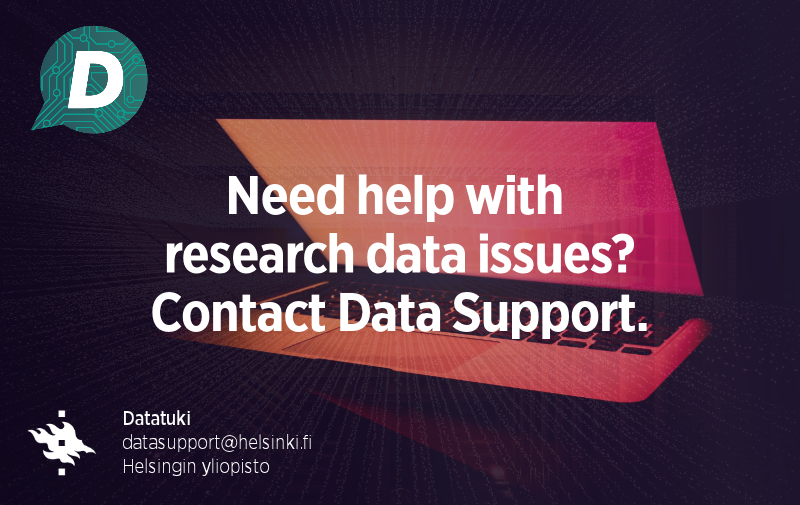The University of Helsinki is currently updating its research data policy. In this Think Open blog post, members of the working group responsible for the update share their views regarding the needs and goals of the new data policy. Their responses indicate that the key goal is for the shared data policy to facilitate the work of researchers in a concrete way, taking the special nature of research fields and research datasets into account. The respondents also agree on the need for clear guidelines and the definition of responsibilities. The importance of services as part of the guidelines is also noted. The UH policy draft is now opened for commentary.
(Tämä artikkeli on saatavilla myös suomeksi.)
Text: Juuso Ala-Kyyny, translated by Kris Jalas
 The University of Helsinki Research data policy, effective as of 2015, will be updated this year. Next year, a separate implementation plan will be drawn up for the new data policy, with descriptions of measures to be taken to achieve the goals of the policy.
The University of Helsinki Research data policy, effective as of 2015, will be updated this year. Next year, a separate implementation plan will be drawn up for the new data policy, with descriptions of measures to be taken to achieve the goals of the policy.
The data policy must be updated due to changing legal requirements in both Finland and internationally, including the EU’s General Data Protection Regulation (2018), the need to develop research infrastructures and the FAIR principles regarding open access to research data.
Update (8.9.2021): The draft version of UH research data policy is now opened for commentary. Give your comments by 4th October 2021.
The implementation plan 2021–2024 (PDF, intranet) for the University of Helsinki’s strategic plan stretching to 2030 outlines the updating of the data policy as one of the key development measures in the area of open science and research. For this purpose, the rector has appointed a working group that began its work in March. In this blog post, members of the working group answer the following questions:
- How should the current data policy be amended?
- What are the features of a good data policy? What is its purpose and practical impact?
- What issues specific to the University of Helsinki must be taken into account in drawing up the new data policy?
The respondents are professor Sampsa Hautaniemi (Faculty of Medicine), professor Sasu Tarkoma (Faculty of Science), professor Pirjo Aunio (Faculty of Educational Sciences), university lecturer Merja Kontro (Faculty of Biological and Environmental Sciences) and vice-rector Paula Eerola, who chairs the working group. The other group members include director of services Pälvi Kaiponen (Helsinki University Library) and IT manager Minna Harjuniemi (IT Centre). You can follow the group’s work in the Flamma workgroup Tutkimusdatapolitiikan päivitys 2021 (”Updating the research data policy 2021”).
What is a research data policy?
”A research data policy is a document that outlines the principles and objectives that guide the management of research data at the University. It also describes the University services that support these objectives and defines responsibilities among the parties involved. Each member of the University community must comply with the research data policy. The document also provides guidelines for all development related to research data management at the University.”
(Rector’s decision on the establishment of a working group to update the University of Helsinki research data policy, 11 March 2021, available in Finnish on the Flamma intranet)
1. How should the current data policy be amended?
”The current University of Helsinki research data policy is good, but broad in nature. Many researchers need something more concrete.” (Sampsa Hautaniemi)
”The significance of research data for scholarship, repeatable and responsible research as well as for society more broadly has increased a great deal since 2015 when the current research data policy was approved. High-quality and accessible research datasets are a strategic resource and a competitive factor for the University, as is also emphasised in the University’s strategic plan for 2021–2030.” (Paula Eerola)
”Adjustments required include the clearer definition of responsibilities with regard to research data as well as issues related to the long-term storage of research data and to the use of data. The planned EU regulation on artificial intelligence may also require that changes be made.” (Sasu Tarkoma)
”The long-term storage of data is necessary for being able to compare results with previous findings. After a research project, new questions about the results of previous research may arise from a new perspective. This will take the assessment of results further and increase the value of funds invested in research. Currently, there are also some weaknesses in project data preservation and storage, which increase the risk of some data being lost entirely. The accessibility of data to all relevant parties should be ensured.” (Merja Kontro)
”As multidisciplinary activities expand, various discipline- and university-specific approaches are brought together and clash with each other. We need a shared platform.” (Pirjo Aunio)
2. What are the features of a good data policy? What is its purpose and practical impact?
”A good data policy is clear and covers the different stages of data collection and use. Data are collected and produced in diverse environments, and it is very important that the data policy encompass all uses of data in scholarly research processes and help researchers with related questions in their day-to-day activities. The day-to-day application of the data policy requires easily understandable instructions, for example, explaining uses and processes through diagrams and descriptions.” (Sasu Tarkoma)
”I agree with Sasu and feel that special attention should be paid to researchers having access to easy-to-use instructions with high utility value to implement the data policy.” (Pirjo Aunio)
”A good data policy is clear and based on common sense. Its purpose is to facilitate researchers’ work, and its practical implementation is straightforward.” (Sampsa Hautaniemi)
”Clear instructions as well as guidelines that everyone knows. Clear descriptions of datasets to ensure that they are easily found. Definition of publishing rights if stored material is used.” (Merja Kontro)
3. What issues specific to the University of Helsinki must be taken into account in drawing up the new data policy?
”Generally speaking, the problem at the University of Helsinki is that we try to make everything fit the same mould, without taking the special features of research fields into account. This should also be kept in mind when drawing up the data policy. For example, the processing of sensitive and non-sensitive data requires different practices although the FAIR principles must naturally be implemented in both cases.” (Sampsa Hautaniemi)
”Important issues relate, for example, to the division of responsibilities for research data between the researcher, the research group and the faculty. The data policy is part of a wider framework in which data use is supported with research data infrastructure and related services. A good data policy is in line with the use and development of research data infrastructure and platforms, forming a viable entity.” (Sasu Tarkoma)
The data policy is part of a wider framework in which data use is supported with research data infrastructure and related services.
”In addition [to what Sasu Tarkoma said above], I would like to emphasise the multidisciplinary dimension, which poses its own requirements.” (Pirjo Aunio)
”The wide scope and multidisciplinary activities of the University of Helsinki set high standards for our data policy because it must be effective and promote all our scholarly fields.” (Paula Eerola)
”Not all data are digital. Biological material often cannot be preserved indefinitely. We need sufficiently detailed descriptions to be able to replicate experiments. Data available on paper should be digitised to reduce facility needs. Researchers also come and go. We should be able to organise the preservation of data so that all essential data can be preserved even if the relevant researchers only work on a short-term basis. We do not always know in advance what data will be important in the future. This makes it more difficult to decide what should be preserved.” (Merja Kontro)

